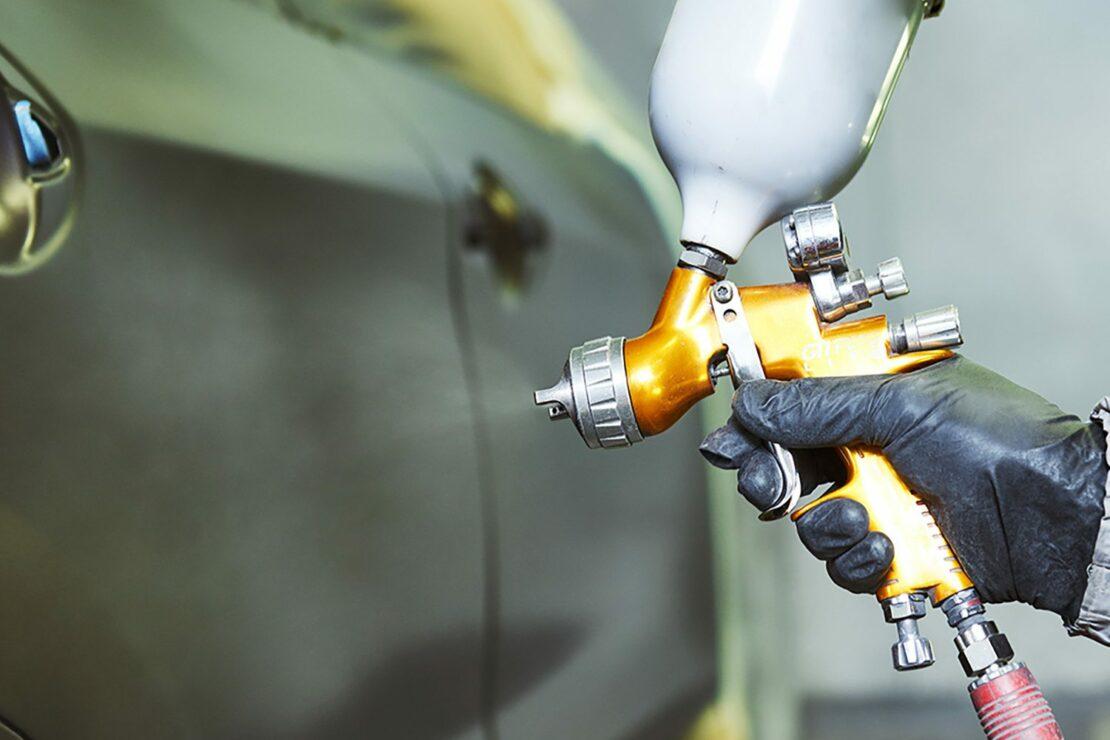Auto body shops reduce pollutants

Air pollution standards are stricter than in the past, and many small businesses like auto body shops use older equipment that can be large sources of air pollution. Making the switch to cleaner equipment can be expensive and many business owners may not know that financial resources available to them.
Environmental Initiative’s Clean Air Assistance Project (CAAP) connects small business owners with resources and funding to replace equipment and reduce their emissions.
Two auto body shops in Ramsey County, Minn., recently completed projects that reduce emissions.
Suburban Auto Body
Dennis O’Connell focuses on making customers happy at Suburban Auto Body. In the four decades O’Connell has owned the shop, it has grown from a detailing garage to an auto body and mechanical outfit with numerous locations. Sustainability is a big part of the mission, with the business’s website stating that, “Suburban Auto Body is an earth-conscious body shop.”
The Little Canada location began the process of replacing its solvent-based car paint with waterborne paint that emit less pollutants last summer after learning about available resources from Environmental Initiative team members.
Environmental Initiative Clean Air Assistance Project team members helped the shop submit grant applications to the Business Pollution Prevention Program (BPPP) and Minnesota OSHA so they could be reimbursed for the expenses. The BPPP helps Ramsey and Washington county businesses such as dry cleaners and auto body shops secure financial assistance to switch to less toxic chemicals and more modern equipment. About 82% of the funds for the upgrades at Suburban Auto Body were provided by Ramsey/Washington Recycling & Energy and Environmental Initiative, with support from 3M.
The booth inside the Suburban Auto Body shop where cars are painted was retrofitted to increase air flow and dry cars faster. This and switching to waterborne paints reduce the volatile organic compounds (VOCs) emitted in the shop. A U.S. Environmental Protection Agency study found that people using paint and other products that emit VOCs can expose themselves and others to high pollutant levels, and elevated concentrations can persist in the air after the product is used.
“Since we received the grant, we can say that our minds are now at ease knowing that using our waterborne paint has less effect on the environment as well as our painters,” O’Connell said.
The modifications prevent an estimated 2,300 lbs. of VOCs from being emitted, improving indoor air quality in the shop and creating a safe, healthier environment for employees and customers.
The entire process of making these improvements–from application to completing the project and receiving reimbursement funds–took less than four months.
“It’s been amazing for our workers as well as my company,” O’Connell said.
Merit Chevrolet
Merit Chevrolet in Maplewood, Minn., recently took steps to reduce the VOCs emitted in their auto body shop through assistance provided by Environmental Initiative and our partners. VOCs can be harmful to human health. Breathing in VOCs can damage the central nervous system and cause some cancers, according to the American Lung Association.
David Sorenson, body shop manager for Merit Chevrolet, became interested in replacing the shop’s paint supply after CAAP team members provided information on available resources.
Environmental Initiative’s CAAP team helped Merit Chevrolet submit grant funding applications to BPPP and Minnesota OSHA, and the shop was awarded financial assistance. The grants and additional aid from 3M helped fund about half of the work.
Thanks to the financial support, the paint booth in the auto body shop underwent modifications to increase air flow, and solvent-based car paints were replaced with waterborne paints. The improvements reduced how much VOCs get emitted in the shop by an estimated 787 lbs., creating a safer and healthier environment for employees and customers.
Up to $50,000 (or 75% of project costs) are available now to owners of eligible dry cleaner, auto body, industrial paint, and printer shops in Ramsey and Washington counties through Ramsey/Washington County Recycling & Energy’s BPPP.